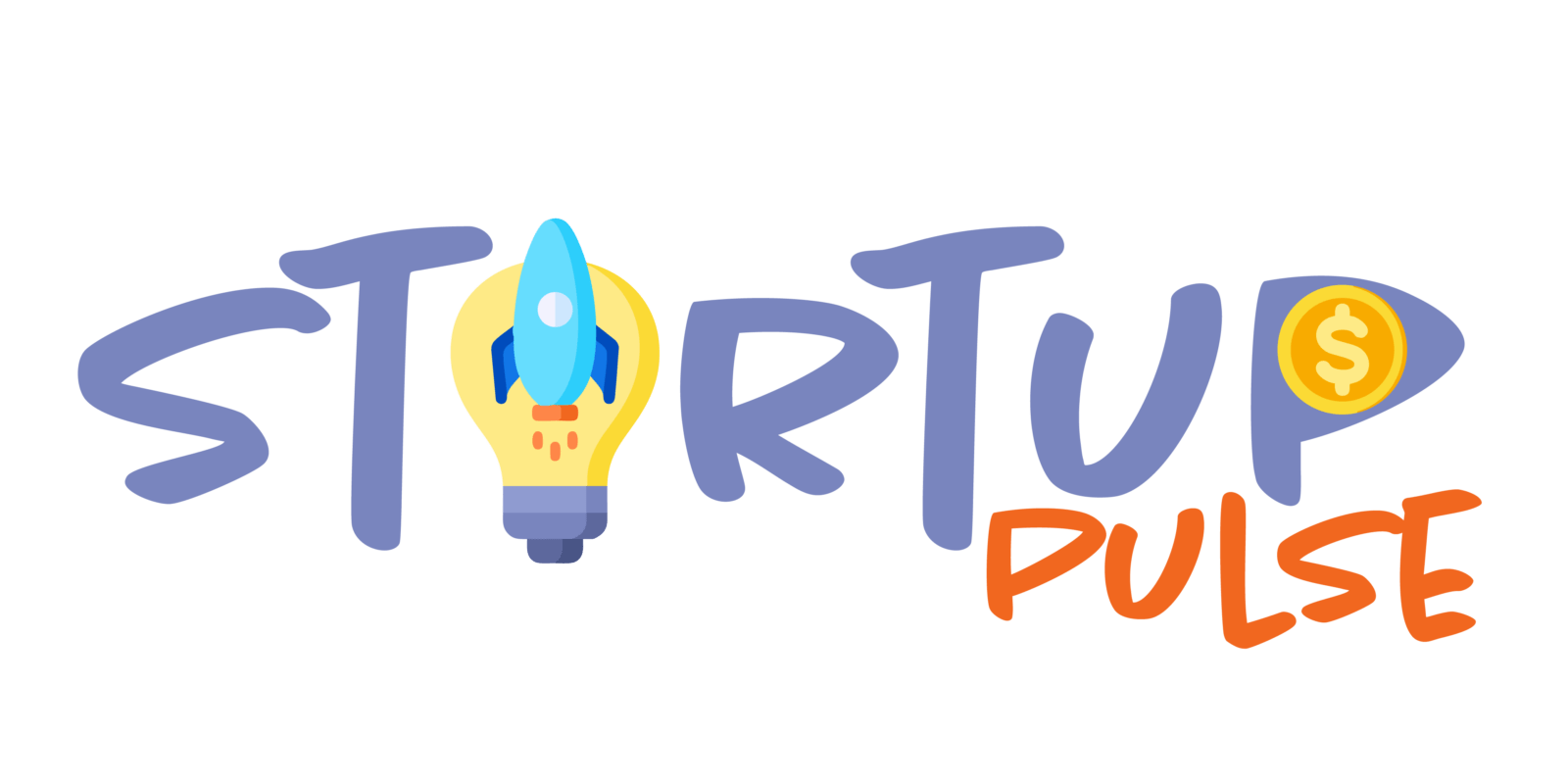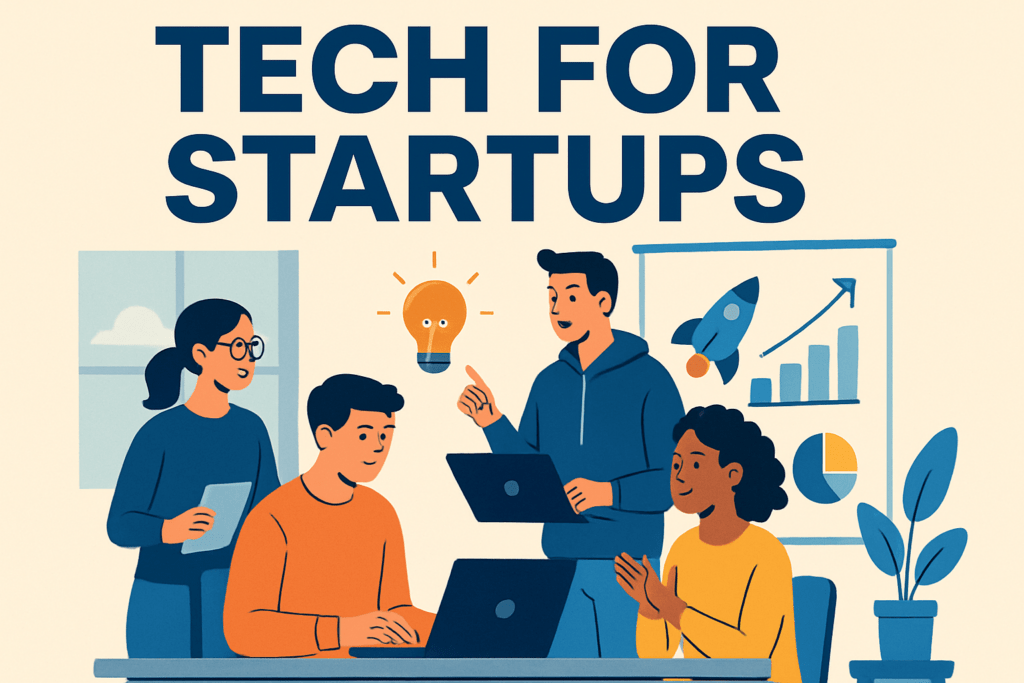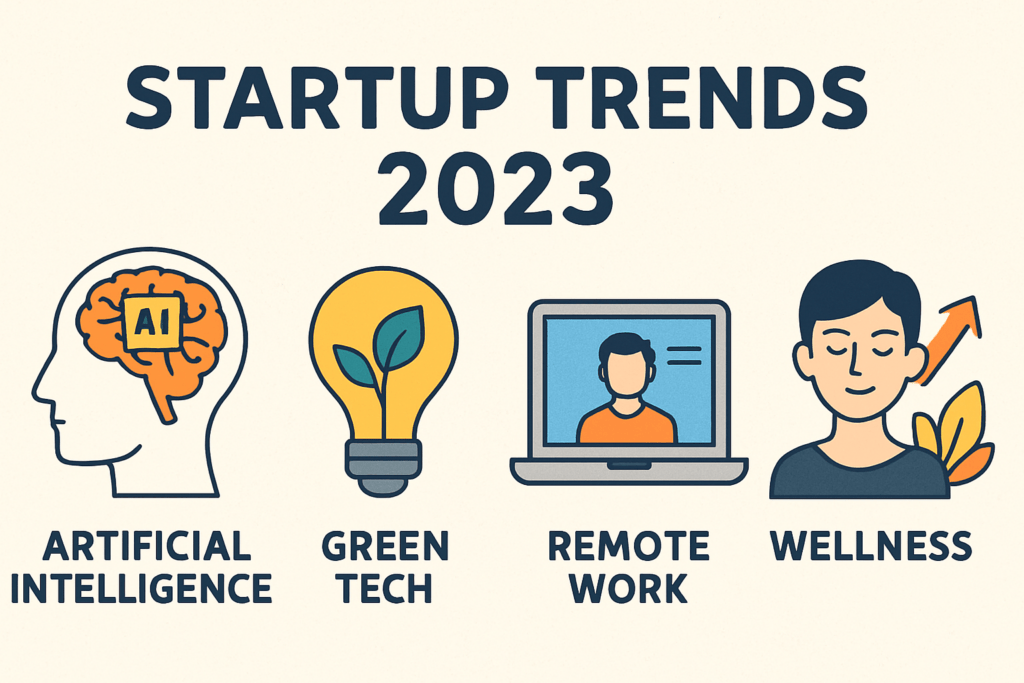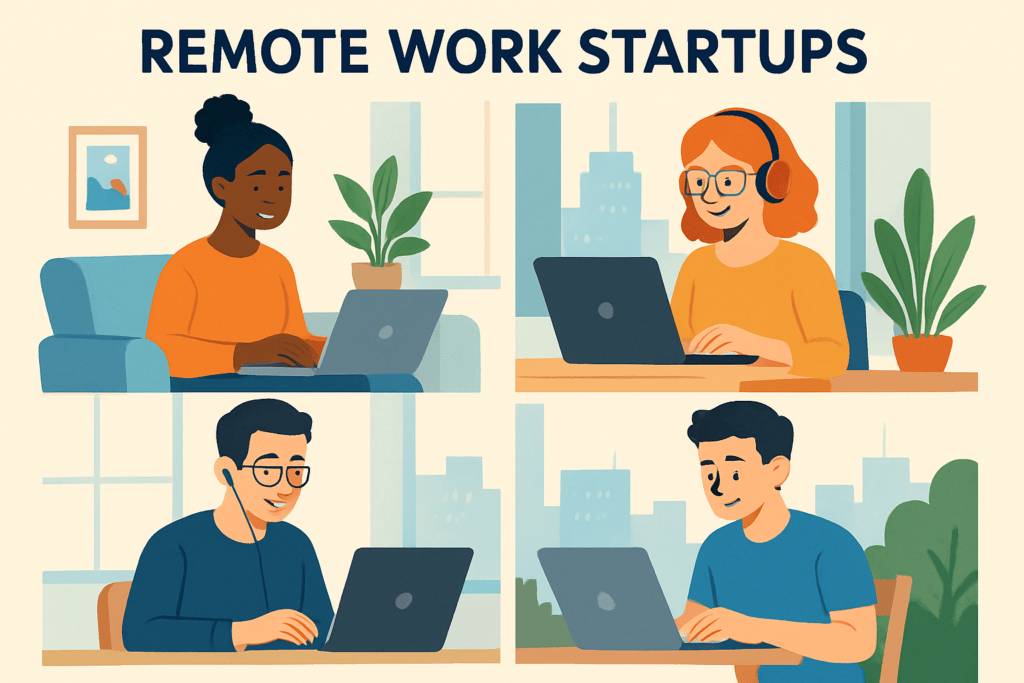Tech for Startups: Why It’s the Game-Changer in 2025
- Intro to the fast-paced startup world and why leveraging new tools is make-or-break.
- Mention how tech for startups continues to break old barriers, helping founders move faster, smarter, and leaner.
- Brief nod to innovative technology and tech-driven startups—what’s pushing the edge right now.
Tech for Startups: Why It’s the Game-Changer in 2025
Startups don’t get the luxury of time. Every decision is a sprint; every mistake, a learning curve you wish you didn’t need. In this cutthroat arena, the real separator—the thing that keeps scrappy teams alive and lets the big ideas win—is technology.
Tech for startups isn’t just hype. It’s the real arms race. Today’s founders aren’t just trying to out-hustle each other; they’re out-tooling each other. From day one, leveraging new digital tools means you’re building leaner, smarter, and faster. What once took months and teams of coders now gets pulled off in a weekend hackathon, thanks to no-code platforms or AI APIs.
We see it everywhere: tech-driven startups popping up and breaking rules the old guard thought were set in stone. Machine learning isn’t an edge case anymore; it’s the expectation. Cloud stacks mean you can scale like a juggernaut from your kitchen table. Fresh blood—first-time founders with nothing but a laptop and a big idea—are solving problems in days that incumbents failed to solve for a decade.
It’s more than just moving fast. It’s about tearing down the barriers—capital, talent, geography—that once kept outsiders out. With each new piece of innovative technology, the next founder gets a shorter runway to their first customer, their first market, their first shot at making a dent. In 2025, tech for startups is the difference between those still playing catch-up and those already breaking away.
What Happens After Winning Millions?
Winning a life-changing lottery jackpot is every player’s dream, but few are prepared for the aftermath. The sudden influx of wealth brings excitement and challenges. Here's a closer look at the journey from euphoria to potential adversity.
Financial Realities
After the initial euphoria subsides, winners face crucial financial decisions:
- Managing Taxes: A significant portion of the winnings often goes to taxes. Failure to plan can cause legal issues.
- Investment Decisions: Many winners hire financial advisors for long-term security, while others spend impulsively, risking their financial future.
- Budgeting: To avoid a financial nightmare, winners must develop a sustainable budget to manage their newfound wealth.
Lifestyle Overhaul
A windfall changes life dramatically:
- Luxury Purchases: Mansions, sports cars, and exotic vacations are now accessible, though not without potential downsides.
- Social Challenges: With wealth comes renewed attention from long-lost friends and distant relatives hoping for a share.
- Privacy Concerns: Public scrutiny and media attention are common challenges, prompting some to lead a discreet lifestyle.
Despite these changes, the transition to a new financial reality is often complex.
Creating a Legacy
Beyond personal enjoyment, some winners aim to leave a lasting impact:
- Charitable Contributions: Many donate to charities or support community projects.
- Educational Initiatives: Funding scholarships or education endeavors becomes a way to give back.
- Business Investments: Investing in businesses can create jobs and stimulate economic growth.
From players to philanthropists, some winners focus on making a positive impact, while others may face financial pitfalls. Their approach not only molds their future but also influences the legacy they leave behind.
Founders in Action: Real Examples of Tech-Driven Startups
What does “tech for startups” actually look like in the wild? Let’s drop the theory and talk shop—real, gritty stories from the trenches. Take EcoLedger, a small team that built a carbon-credit marketplace in under six months using no-code tools and blockchain. They leapfrogged bigger, slower rivals by rolling out updates weekly, not yearly, and now process millions in verified green transactions. That’s digital entrepreneurship in motion.
Or check out SwiftlyAI, which went toe-to-toe with legacy logistics players by automating supply-chain predictions using affordable, off-the-shelf AI. They pulled off a pivot—switching markets from Europe to Southeast Asia in weeks—just by plugging new data into existing tech. When big guys were stuck in committee, SwiftlyAI was already shipping.
Even health startups are redefining the rules. MitoWell launched a wearable that tracks cellular health, combining cloud analytics with rapid app rollouts—without a single full-stack developer on payroll. Their edge? Using low-code platforms to A/B test features, learning fast and burning less cash.
A common thread: tech isn’t just a helper; it’s the engine. These founders didn’t just keep up—they pulled ahead. And it’s not just about speed or buzzwords. More founders are baking in startup sustainability trends from day one, turning efficiency into an advantage and future-proofing their business.
Long story short: In 2025, the winners are those who build with new tools, stay lean, move fast, and never stop iterating. The rest? Playing catch-up.
What’s Next? Cutting-Edge Innovations on the Horizon
Here’s the not-so-secret truth: the tech just keeps coming. If you’re a founder, you need to keep one eye on the next curve in the road, not just today’s dashboard of tools. Quantum computing is finally moving off the PowerPoint slides and beginning to offer real possibilities. It’s early days, but startups are already poking at it for everything from rock-solid security to reimagined logistics and massive data processing. Most of us aren’t ready for quantum tomorrow—but the point is, the timeline has started to shrink.
Advanced robotics is another field getting less sci-fi, more how-much-does-that-cost. Whether it’s delivery bots, warehouse automation, health care gadgets, or all-purpose mechanical arms, robots are getting cheaper, smarter, and—critically—easier for small teams to use. You don’t need to build Tesla’s next factory to get value from them.
Then there’s AR and VR, both inching closer to the mainstream with each hardware and software leap. We're talking immersive product demos from your living room, remote-first team collaboration where it feels like everyone’s in the same room, and customer experiences that are five years ahead of current norms. Founders willing to jump in early—to tinker and build before everyone else—often come out miles ahead.
The trend here? Startups are the first-movers, not the stragglers. Like always, early adopters get the learning curve (and the bruises), but sometimes they land on the next big thing while everyone else is still googling “What is this?” If you’re in the game, keep your radar up: tomorrow’s advantage is being built—right now, in the margins—by people willing to bet on what's next.
Staying Nimble: How Startups Can Keep Up
Let’s be real: technology isn’t going to slow down and wait for you to catch up. Startups that thrive in 2025 will be those that keep their edge sharp—and their playbook open. So, how do you fight off tech FOMO without burning your team out or chasing every shiny new app?
First, get comfortable with piloting new tools. Don’t wait for ten competitors to prove something works—set up quick, low-risk trials inside your own workflow. Turn your early adoption into an active advantage, or fail fast and move on.
Second, make change part of your culture. “We’ve always done it this way” is the startup death rattle. Build a team that gets curious about new tech. Have someone (or everyone) on alert for what’s emerging. Encourage experiments, internal demos, and maybe even a monthly “tech show-and-tell” over lunch.
Collaboration is another secret weapon. Partner with other companies, seek out accelerators, or join founder circles where cool tools are passed around like secret recipes. Don’t go it alone.
Upskilling matters, too. The best founders—and teams—are learning machines. Seek out short courses, tutorials, and webinars. Make room for regular, micro-learning moments. When your people grow in digital entrepreneurship, so does your company’s firepower.
Finally, run regular tech audits. Strip out tools that aren’t doing the job; double down on the ones that are. A lean, high-performing stack is better than a cluttered collection of half-used subscriptions.
Bottom line: Stay hungry, stay flexible, and nurture a tech-aware culture. Nimble startups aren’t just users of technology—they’re the ones driving it forward, one small experiment at a time.
What Happens After Winning Millions?
Winning a life-changing lottery jackpot is a dream come true for many players, yet few are prepared for the numerous changes it brings. The sudden influx of wealth can incite excitement but also a host of challenges that aren't always foreseen.
Financial Management Challenges
Suddenly coming into wealth requires significant financial planning:
- Tax Obligations
- A substantial portion of winnings often goes to taxes, necessitating careful planning to avoid legal issues.
- Investment Strategies
- Winners face decisions between making prudent investments for long-term security and the temptation of immediate, lavish spending.
- Financial Advisors
- Some choose to hire advisors for expert guidance, while others struggle with reckless expenditure.
Failing to plan adequately can swiftly turn dreams of endless riches into a financial nightmare.
Lifestyle Changes
Newfound wealth often leads to a dramatic shift in lifestyle:
- Indulgent Purchases
- Luxury homes, exotic cars, and extravagant vacations frequently become part of the winner's reality.
- Social Dynamics
- Friends and distant relatives may surface, hoping to share in the fortune, often leading to tension and difficult choices.
- Privacy and Attention
- Dealing with sudden fame and the pressure of public scrutiny can be overwhelming.
Some winners prefer a low-profile lifestyle to avoid these challenges, though adjusting to such wealth is rarely simple.
Making a Difference
Many winners look beyond personal gain and choose to make a positive impact:
- Charitable Initiatives
- Donations to charities and community projects come from a desire to give back.
- Business Investments
- Some invest in businesses or initiatives that seek to create jobs or revitalize struggling areas.
Stories of winners funding scholarships or launching nonprofits highlight their broader vision of contributing to society.
Conclusion
The way winners manage their newfound wealth significantly influences their future and the legacy they create. While some use their riches wisely, others face financial downfall. Therefore, the outcome of winning millions hinges not just on luck, but careful planning and responsible decision-making.
Conclusion
At the end of the day, tech for startups isn’t just a booster—it's the heartbeat of modern entrepreneurship. Whether you’re a solo founder grinding on a big idea or a nimble crew ready to upend stale industries, your tech stack is your edge. Stay curious, stay scrappy: the startups that keep experimenting, learning, and adapting with new tools are the ones who become tomorrow’s unicorns. The next big breakthrough is out there—it’s just waiting for founders willing to wield the right technology to claim it.




